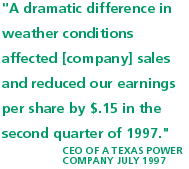 |
 You make every possible effort to run an efficient operation. Yet an unusual winter or extraordinary summer can lay your careful planning to waste, driving up your costs or depressing demand. You watch helplessly as projected profits turn into losses. A bit of extra planning, however, can protect you from such a setback. You can safeguard your company against the financial impact of extreme weather conditions.
You make every possible effort to run an efficient operation. Yet an unusual winter or extraordinary summer can lay your careful planning to waste, driving up your costs or depressing demand. You watch helplessly as projected profits turn into losses. A bit of extra planning, however, can protect you from such a setback. You can safeguard your company against the financial impact of extreme weather conditions.
Our risk management programs can compensate you for weather-related losses
 Enron Wholesale Services specializes in developing and providing innovative financial products. Our weather risk management programs are designed to protect companies against weather conditions adversely affecting revenues. Degree day swaps can provide revenue stability; floors and caps can provide revenues offsetting adverse weather conditions; and collars can ensure the same level of protection without the need for premium payments. The result can be significant cost savings and a more stable revenue flow. Your company looks substantially better to investors and potential lenders. You can budget and be protected from the vagaries of weather. Enron Wholesale Services specializes in developing and providing innovative financial products. Our weather risk management programs are designed to protect companies against weather conditions adversely affecting revenues. Degree day swaps can provide revenue stability; floors and caps can provide revenues offsetting adverse weather conditions; and collars can ensure the same level of protection without the need for premium payments. The result can be significant cost savings and a more stable revenue flow. Your company looks substantially better to investors and potential lenders. You can budget and be protected from the vagaries of weather.
Who benefits from Enron weather risk management programs:
- Utility and energy companies can protect their volume-related revenue against, for example, cooler than average summers, or unusually warm winters. They won't be forced to raise rates in an increasingly competitive market.
- Distributors of crude oil, heating oil, and propane can make up for reduced business in the winter when warm temperatures depress demand.
- Agricultural companies can replace revenues that might be lost due to freeze or drought. This adds stability to an inherently unpredictable business.
- Insurance companies can reduce their own exposure to weather-related claims. Risk products tied to rainfall, for example, can provide the funds to pay flooding claims.
- Financial institutions can incorporate these products as a way to broaden a client's portfolio.
How weather risk programs work
 A typical risk management contract will be written in terms of cooling or heating degree days. This is a measure of how far the mean daily temperature deviates from 65°F (requiring users to run their air conditioning or heating). However, contracts can also be written in terms of maximum/minimum temperatures, rainfall, streamflow, or, if required, any combination of these.
A typical risk management contract will be written in terms of cooling or heating degree days. This is a measure of how far the mean daily temperature deviates from 65°F (requiring users to run their air conditioning or heating). However, contracts can also be written in terms of maximum/minimum temperatures, rainfall, streamflow, or, if required, any combination of these.
 |





